Des del campus
7. From campus
Debate leagues at UPF: a successful model thanks to collective input
Over the years, UPF has been committed to promoting its own strategy in debate leagues, which has led it to win the competitions organized by the Vives Network of Universities on several occasions. Under the framework of EDvolution, the debate leagues are an example of the inclusive concept of learning that UPF advocates, involving aspects of training, social responsibility and attracting talent.
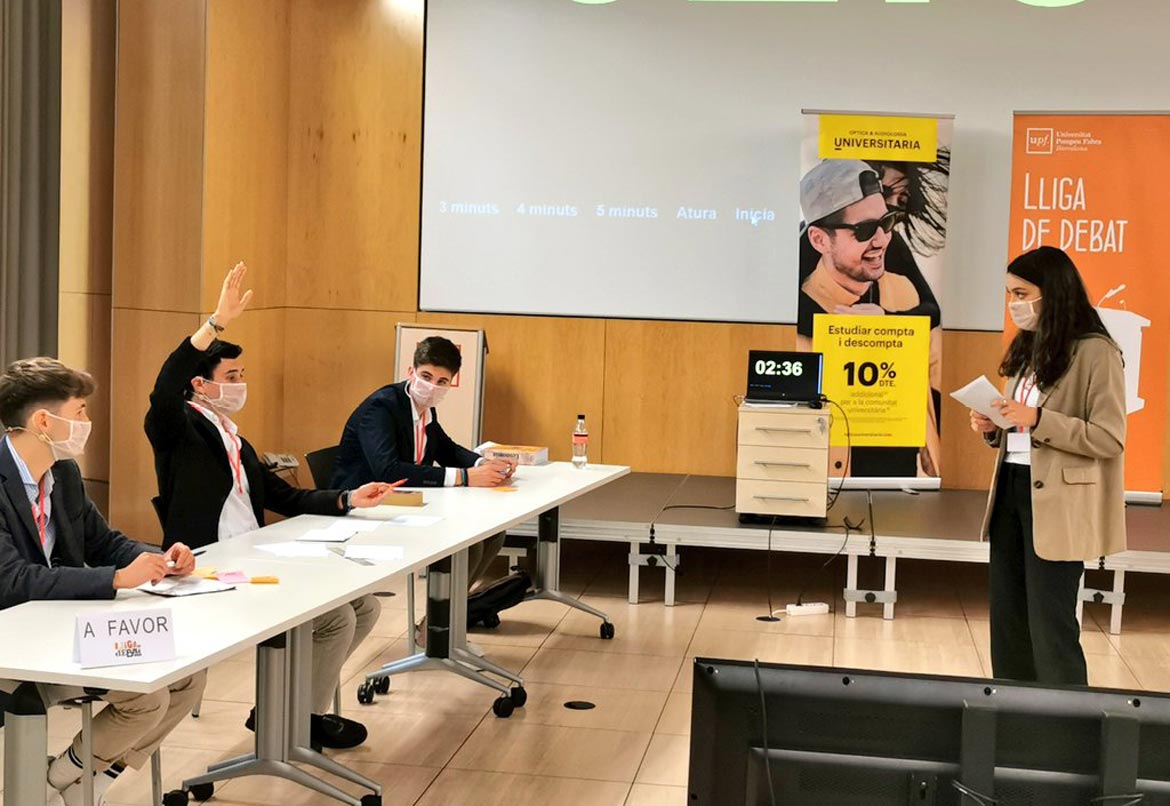
It was in the 2009-2010 academic year that the University, through the University Community Assistance Service (SACU), organized the first internal UPF debate league (LDUPF). Previously, in 2006, UPF had already participated in what was the second season of the of the Vives Network of Universities Debate League (LDXV).
The first UPF debate league (internal) was an idea promoted by Eulàlia Solé, a political science student at the time, who approached SACU to seek support to to carry out the activity. Currently, Eulàlia is a professor of public speaking at the Department of Political and Social Sciences and one of the people who has helped the most to develop the UPF debate league project.
Thus, UPF began to implement a strategy to consolidate debate leagues as a teaching aid and a key activity for acquiring communication skills.
A few years later, and taking into account the results achieved in the various competitions and the increasing participation in them, it can be said without any doubt that the commitment by our institute to the debate leagues has been a success: you need look no further than the 2020-2021 academic year in which the University won the “double”, becoming champion of the LDXV and at the same time, the Escola Ginebró school, which represented UPF in the final round of the Vives Network’s Secondary and High School Debate League (LDSB), also came out tops.
Debate leagues are a dialectical competition that allows putting public speaking skills into practice, in accordance with rules that the participants must know, in order to prevail over the rival team and convince the panel. UPF uses the adaptation by the Vives Network of Universities of the regulations established by the Jove Cambra de Catalunya (youth Chamber of Commerce) association, a kind of debate representative of the so-called “academic debate model”.
Within the framework of EDvolution, UPF’s new educational model, the debate leagues are an example of the inclusive concept of learning advocated by the University.
Pablo Pareja, vice-rector for Teaching Staff and Community Relations, explains that “the debate leagues are an excellent expression of what the EDvolution project involves and what it seeks to promote. It is an experience that acknowledges that learning does not only take place in the subjects that make up the various undergraduate or graduate programmes, as it clearly places the student at the centre of the learning process and encourages a type of collaborative learning”.
According to the vice-rector, the debate leagues are a fantastic complement to the many other learning experiences in which students participate during their time at the University, and are stamped in their UPF Passport. “UPF is not the only university that has recently made a strong commitment to debate leagues, but we can say that it is one of the ones that has made the greatest effort to integrate them into the students’ global learning experience. Every year, more and more people wish to take part in them”.
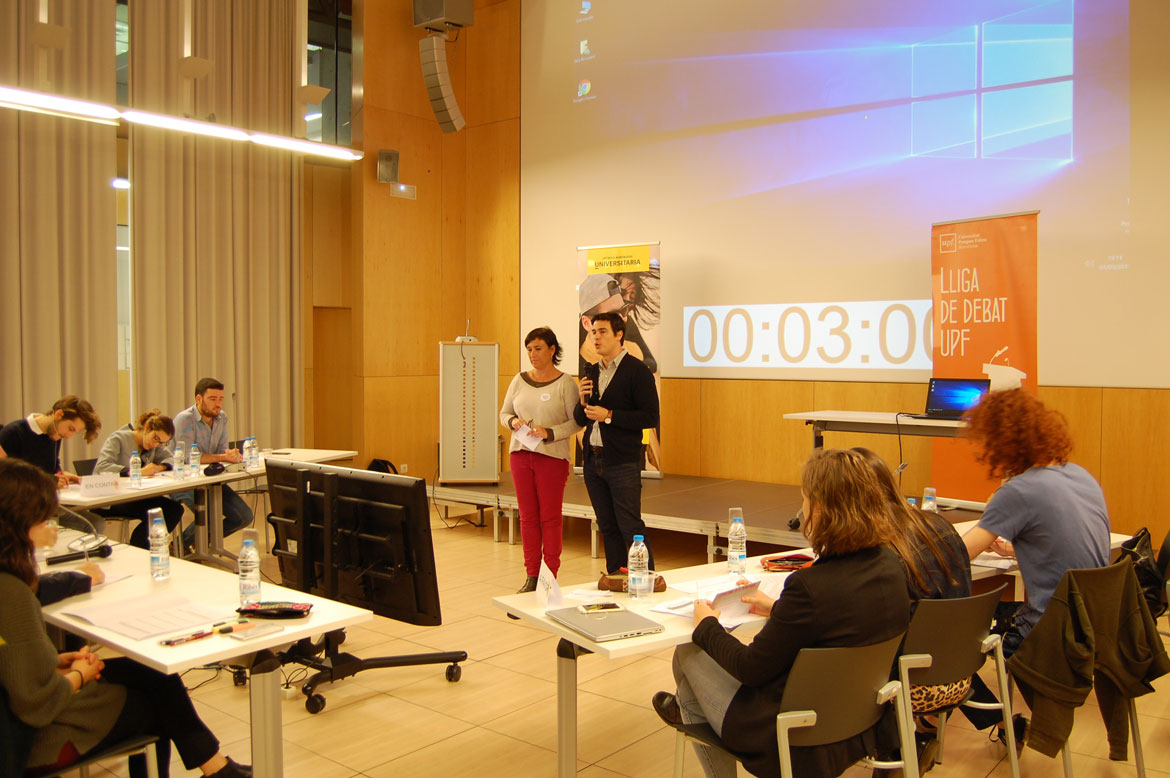
These efforts have been channelled from the SACU, which organizes the logistics, the competition, support for participants, the training and the panel of the debate leagues at UPF
These efforts have been channelled from the SACU, which organizes the logistics, the competition, support for participants, the training and the panel of the debate leagues at UPF, and has also adapted these procedures to other contexts, such as secondary and high school as well as prisons. “The debate leagues have become a key part of the activities on offer at the university targeting students”, points out Gemma Garcia, head of the SACU. In her opinion, organizing the LDUPF and the local phase of the LDSB “is a challenge, with input from the entire university community in which students, professors and experts participate”. For example, in the case of the LDUPF, more than 80 students and some fifty judges usually take part.
A strategic tool that has resulted in an unmistakable model
The planning of the debate leagues, which form the basis of the improvement plan that the University is putting into practice, hinges around three strategic axes: firstly, it considers them a training tool, from the new line offered via the Participation Workshop and especially, from the minor in Public Speaking; secondly, a proposal of social responsibility, as the University extends the leagues to vulnerable groups, such as women prisoners or young people in highly complex schools, through projects such as Horizons.
The third strategic line has been the conception of the debate leagues as a tool to promote and attract talent, which facilitates the creation of networks of interest: a space invigorated by the UPF network of associations formed by a group of mobilized students and alumni. Pablo Pareja emphasizes that the University promotes participation in this area especially through two actions: “On the one hand, students’ involvement, both individually and in associations, in promotional activities, in the design and organization of the leagues; and on the other, through the training programme that is run parallel to the debate leagues, directed most successfully by the SACU”.
But, based on which model has UPF’s sustained commitment to the debate leagues over time materialized? According to Maria Teresa Albero, head of projects at the Vives Network of Universities, “UPF’s participation in the debate leagues can be distinguished by the institution’s direct involvement in the creation, mentoring, training and full support of the participating teams, with specifically designated staff, both from the university student body itself and from secondary and high school students and teachers. And this institutional effort and commitment have translated into teams competing in and winning the finals year after year”.
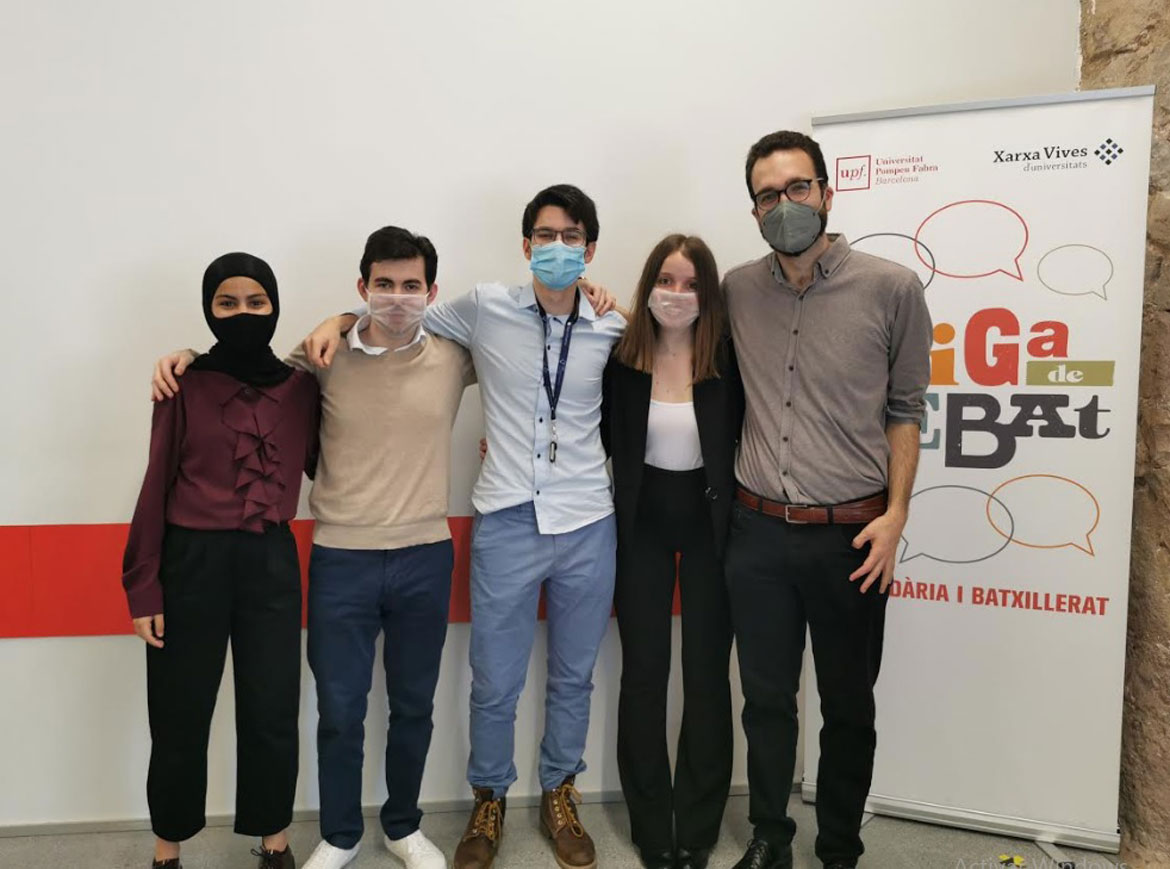
Hence, UPF has been LDXV champion in 2012, 2016 and 2021, and the secondary and high school team of the school that has represented UPF has been proclaimed the winner of the LDSB in 2015, 2018, 2019 and 2021, in addition to being runners-up several times in both categories. Maria Teresa Albero believes that “UPF, based on the experience of the university category, was able to take advantage of the opportunity to train its students, the future professionals; and the evolution in the successes achieved over time shows that the chosen model is a winning one”.
based on the experience of the university category, was able to take advantage of the opportunity to train its students, the future professionals; and the evolution in the successes achieved over time shows that the chosen model is a winning one
For Sergi Lostao, an adjunct lecturer at the UPF Department of Political and Social Sciences, LDSB trainer in public speaking and captain of the University team that won the LDXV 2021, “the key is that the University has made such a strong institutional commitment to the debate leagues as a fundamental part of student education. The SACU’s involvement is the cornerstone, both for the organizational part and to be able to work with a broad network of collaborators who can offer training and support in different areas. Time and resources are needed, but the results are worth it”.
What are the features of the UPF model?
The head of projects at the Vives Network of Universities offers some clues as to the distinguishing features of the UPF model: “The main characteristics of the UPF model in the debate leagues are based on the orderly, rigorous preparation and presentation of the debates, on the good management of the values of each and every member of the team and the different roles they may play, and on absolute respect for and ‘active listening’ to the competing teams”.
From an internal point of view of the university community, Gemma Garcia fully agrees with Maria Teresa Albero, and believes that the “UPF model” can be defined rather as “a dance” than “a fight”: “The style is based on active listening and respect for the other team. We also try to make our speakers highly adaptive and flexible, instilling values that are a far cry from the model of the aggressive speaker, who imposes but does not convince”, she points out.
The style is based on active listening and respect for the other team. We also try to make our speakers highly adaptive and flexible, instilling values that are a far cry from the model of the aggressive speaker, who imposes but does not convince
According to Sergi Lostao, who experiences the debates from within, “UPF promotes a model where aspects are valued such as depth of content, teamwork and healthy competitiveness among participants. These are our hallmarks”. Alba Vilanova, UPF Humanities alumni, winner of the LDUPF 2019 and trainer of the LDSB and of the league at Brians 1 penitentiary, believes that the UPF model “is characterized by the fair play and feedback offered at all times, which yields constant evolution”. For her part, Berta Solé, another UPF Humanities alumni, who has been chief judge of the LDUPF (of which she has also been a trainer), the LDSB and the LDXV, assures that the key to the UPF model is that “it teaches how to argue, to do so in a simple way, and to get the message across in very clearly and directly”.
The UPF and Vives Network debate leagues, an itinerary connected by public speaking
The last two seasons of the UPF Debate League (LDUPF) involved 28 teams and 83 participants (2019-2020 academic year) and 16 teams and 46 participants (2020-2021 academic year), respectively. Open to all students, the University has been organizing the LDUPF since the 2009-2010 academic year. Five years later, in the 2014-2015 academic year, the league incorporated Societats a Debat, a competition organized by the Faculty of Economics and Business, with the inclusion in the quarter-finals of a series of debates on issues related to the economy, and special prizes.
The LDUPF teams are made up of three students, and on competition days they have to pass several knock-out stages and are scored by a panel to become the winning team. And if they are chosen, they go on to compete against other universities, representing UPF in the LDXV: this league is open to the 22 universities that belong to the Vives Network, and in the latest edition (held online due to the pandemic), won by the Pompeu Fabra University team, fourteen universities participated.
With regard to the Secondary and High School Debate League (LDSB), each team consists of at least three and a maximum of five students from the same school. Teams must register for the local stage of one of the Vives Network member universities. The team captain is a teacher at the school and acts as spokesperson and liaises. The local phase corresponds to the preliminary round and takes place on the premises of the university it represents. The winning teams of the respective local rounds represent the reference university in the final round. UPF organizes the local phase, which usually involves more participants and more pre-registrations: in the 2019-2020 academic year, the last year in which registrations were made before the pandemic, 24 teams and 118 students took part. In the 2020-2021 academic year, held online, five teams and 40 students took part.
Adoption of the competition by the Brians 2 and Brians 1 penitentiaries
Under the agreement signed in 2015 between UPF and the Penitentiary Services of the Catalan Government, the University submitted a pilot project to the Justice Department to adapt the debate leagues to a penitentiary centre, with the aim of promoting inmates’ communication skills. It was thought that acquiring such skills and abilities could prove highly useful for their reintegration process, while working with this body could also lead to personal and professional growth for the entire training and organizational team.
The project kicked off in the 2015-2016 academic year with the organization of a debate league targeting inmates at the Brians 2 Penitentiary Centre, which included a week’s prior training in public speaking for those involved. This activity was carried out within the framework of the Centre de Formació Víctor Català (CFA Víctor Català) school for adults. After four editions at Brians 2, in the 2019-2020 academic year this model was applied to Brians 1 women’s prison, in collaboration with the Artur Martorell Training Centre (CFA Artur Martorell), which will also host the forthcoming edition in May 2022. In this case, the project, co-organized with the UPF Equality Unit, is working especially from the gender perspective, with the aim of empowering the participating inmates.
Functioning and structure of the dialectical competition
In most cases, a few minutes before the start of the debate, the standpoints (proposition or opposition) that each team will have to uphold are drawn. In some competitions, such as the UPF Debate League, the topic of the debate, related to controversial current affairs, is disclosed 25 minutes before the start. In the Vives Network leagues, the topic is announced in advance. Some of the issues in recent editions of the leagues have dealt with whether “The current education system guarantees people’s progress” (LDXV and LDUPF) and whether “The global growth of the economy is compatible with respect for the environment” (LDSB).
Once the standpoints, the speakers and the members of each team have been decided, the competition begins.
The standard structure for the debates is as follows:
| Turn | Team A "agree" | Turn | Team B "against" | Time |
| 1st | Introduction | 2nd | Introduction | 5' |
| 3th | Argumentation | 4th | Argumentation | 4' |
| 5th | Refutation | 6th | Refutation | 4' |
| 8th | Conclusions | 7th | Conclusions | 3' |
The debates are subject to a certain structure known by the teams in advance, to which they adapt their discourse. Proper use of turns is essential in order to get the most out of every moment of the debate. The turns are as follow:
-
Initial presentation or introduction: the team introduces itself and the line of argument is outlined to defend a solid thesis. Each team sets out its perspective on the subject of the debate, establishing the general lines of their argument. As this is the first intervention by the teams, it is important to give a light presentation that grabs and keeps the attention.
-
Argumentation: in this round, the arguments that have been announced in the introduction are elaborated on and in this way the bulk of the preparation for the debate is presented: the main arguments, data, examples...
-
Rebuttal: after hearing the opposing team comes the round of rebuttals, trying to dismantle the rival argument, firmly defending the team’s own criteria. In this round, the opponents can ask the speaker questions to interfere with their explanation and dilute its content. Now is the time for rebuttals and counter-rebuttals between the two teams.
-
Conclusion: the last round, conclusions, will serve for both teams to sum up their arguments, highlight the weaknesses of the opposition, and end up presenting the thesis itself. It is the last intervention and is often decisive for the outcome of the debate.
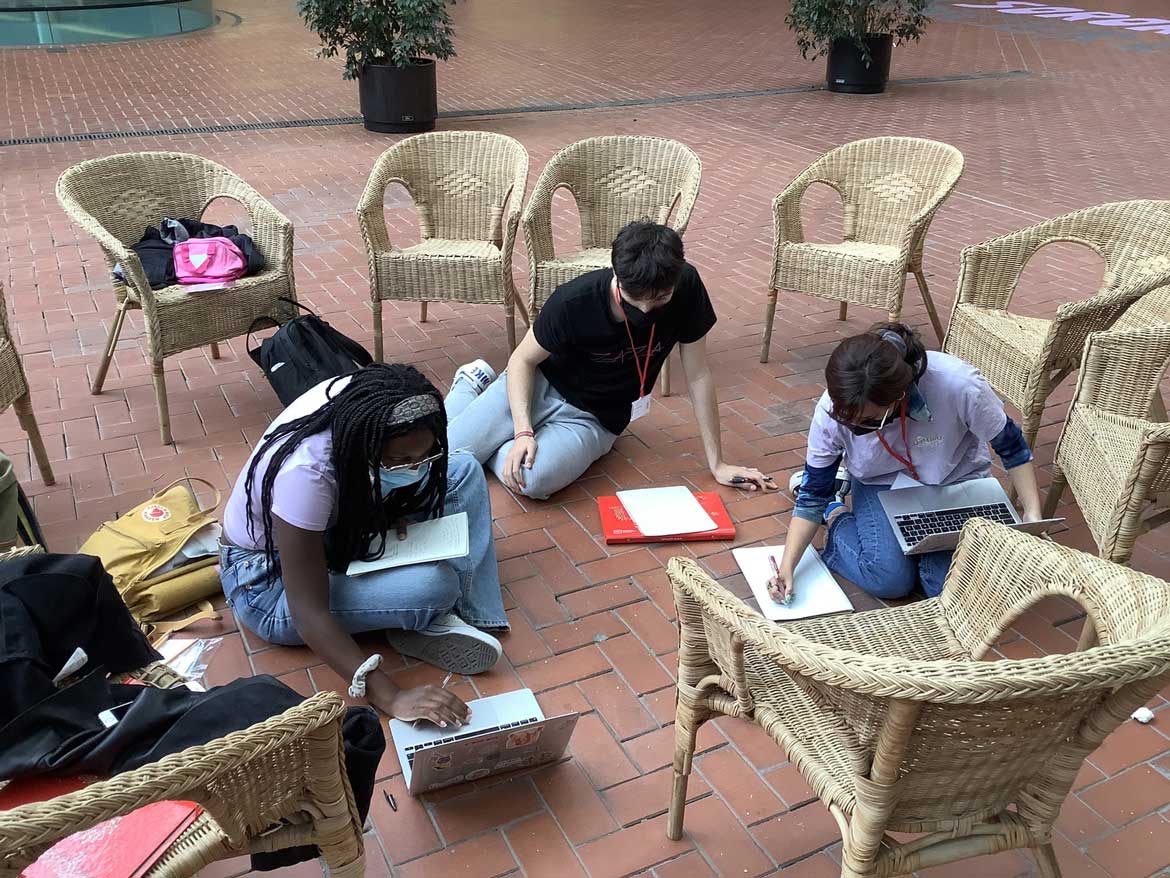
Shelia Canudas, a student of the bachelor’s degree in Law, has been a member of the winning team of the LDUPF (2020) and of the LDXV 2021. She explains that during the competition the atmosphere is very good and the participants live it very intensely: “Competition days are long and tiring, but they are well worth it. They are the opportunity to meet people from other teams, and strengthen ties with your own”. And she adds: “You learn a lot: in a short time you have to find out about a topic, look for arguments and counter-arguments to refute those of the opposing team, support them with data, find a story to capture the attention of the public and of the panel...”. Shelia stresses that “you have to share out the work well and agree, which often means yielding”.
Competition days are long and tiring, but they are well worth it. They are the opportunity to meet people from other teams, and strengthen ties with your own
The boys and girls from the school team at Escola Ginebró in Llinars de Vallès, who participated in the LDSB on behalf of UPF and were proclaimed champions in the 2021 edition, also offer a very positive appraisal:
Prior training, key to the success of the debate leagues at UPF
One of the determining areas of UPF’s success in the debate leagues, as is emphasized by all its protagonists and those involved in the organization, is the prior training in public speaking provided to the teams participating in the various categories. In the LDUPF, the training consists of two sessions taken by experts, in which participants have the opportunity to learn new techniques for public speaking and debate. In fact, this training is considered the first part of the league, while the second part is the actual competition.
Berta Solé, who has been a trainer at the LDUPF, underlines that “prior training teaches you what oral language consists of, a series of elements that come into play, such as intonation, silences, non-verbal and paraverbal expression, etc. You have to work hard on everything related to argumentation, the capacity for analysis, and know how to think well and critically, to help find the opponent’s weak arguments".
In addition to participating in the leagues, Sergi Lostao and Alba Vilanova have also been involved in training tasks. Sergi points out that “students come with different skills or talents, and prior training is essential to be able to level out such differences, and to raise the level of all the debates”. Meanwhile, Alba highlights that “training in public speaking offers a very useful toolbox for communicating, both verbally and non-verbally, and in discourse construction. This knowledge is later fine-tuned in practice. In addition, prior training unites students and foments teamwork”.
Training prior to the LDSB and at Brians 1 and 2 and contact between trainers and participants
Enric Matamala is a teacher at Escola Ginebró and captains the centre’s team. Since 2016 he has participated in all the local rounds of the LDSB at UPF (except in 2020, when he did so with the UB) and has been champion twice, the last time in 2021. He says that, “training prior to the local round of the LDSB offered by UPF is interesting, as it introduces students to the world of public speaking in simple terms. But, what is really spectacular is the training that UPF gives to the winning team of the local round to prepare for the Vives Network final rounds. The support and coaching provided to the team is intense and of the highest quality. For the students who have received this training, there is a before and an after when facing the challenge of presenting an oral communication before an audience”.
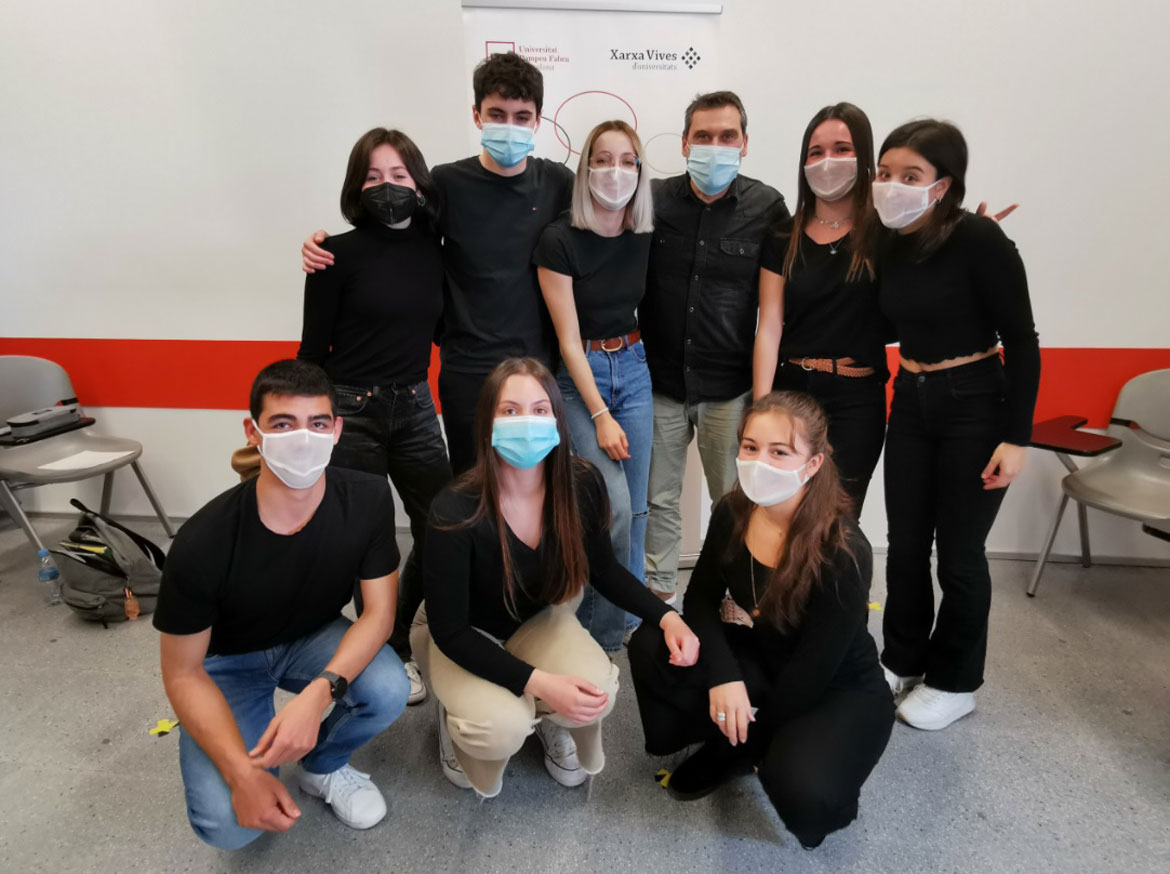
The training participants acquire in the Brians 1 and Brians 2 debate leagues has special significance. Núria, a teacher at the Artur Martorell Adult Training Centre (CFA) at the Brians 1 Penitentiary Centre, involved in the Brians 2 and Brians 1 debate leagues, and responsible at the centre for organizing the forthcoming edition of the Brians 1 league, believes that “the success of the league in both centres is closely related to the training and follow-up process overseen by UPF captains and trainers. Throughout the process, they manage to grab the attention of the inmates, improve skills like public speaking, but also increase their self-esteem and sense of belonging to the group”. Núria also mentions the work done by the CFA teaching staff, with their involvement in the whole process and being part of the teams.
Throughout the process, they manage to grab the attention of the inmates, improve skills like public speaking, but also increase their self-esteem and sense of belonging to the group
For Alba Vilanova, who was a trainer in the Brians 1 league, “a unique, quite different experience is established due to the fact that it is not mixed. With the women in the team we made a very special connection that bore fruit in a big debating competition. We learned a lot from each other”. She also points out that “on a personal level, it has given me the opportunity to discover the reality of prisons, which I believe are a reflection of the society in which we live, and to refute stigmas and prejudices”.
Núria values this contact between the different groups most positively: “The closeness and empathy shown by the UPF captains and trainers are conducive to creating a space for learning, teamwork and respect, which is very positive for the development of the league. Good bonds are formed. For the inmates, these experiences are very enriching, as they feel important, at the centre of the debates where they have a voice which is heard and valued”, she reflects.
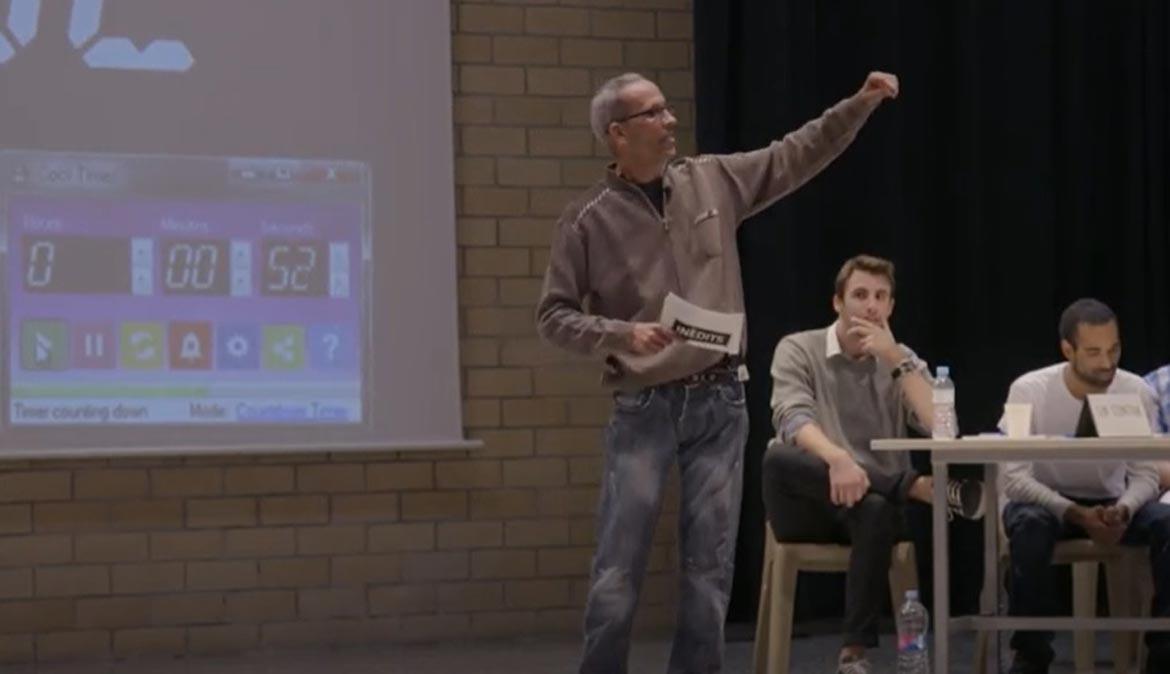
The importance of the judges’ feedback
But, if prior training is important, the feedback given by the panel judges to the participants is no less so, as it consolidates the learning, indicates significant points for improvement, and allows establishing fluid communication between the two parties.
Berta Solé, Alba Vilanova and Sergi Lostao, who have acted as judges of the various competitions (Sergi and Berta as chief judges) stress the importance of this communication: “The judges’ feedback at the end of the debate is an element of learning for the participants, as it guides them as to what they can improve on”, assures Berta, who mentions the two main elements that judges take into account when evaluating, based on certain guidelines: content (solid thesis, good arguments, etc. ) and form (clarity and consistency of presentation, interaction, and ability to refute the arguments posed by the other team, etc.). In any case, she observes that “no matter how good the formal presentation is, if the content is not appropriate, it is difficult to win a debate”.
The University is tending towards a jury with experience in debate leagues and even with some training in the task, which improves the feedback and encourages more justified verdicts
Sergi states that “an effort has been made at UPF so that the judges do not limit themselves to giving a verdict and nothing more”; and he adds: “The University is tending towards a jury with experience in debate leagues and even with some training in the task, which improves the feedback and encourages more justified verdicts”, he reflects.
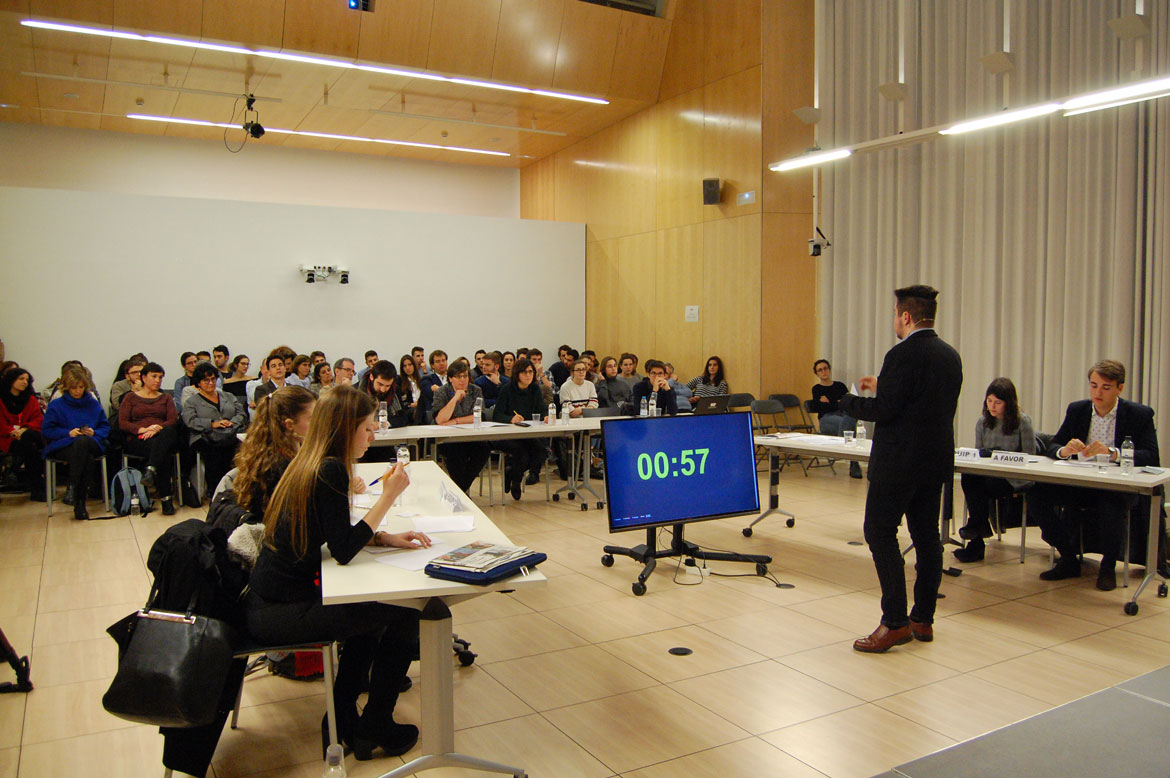
Skills and competences acquired by the participants
Through public speaking, participation in debate leagues provides a whole series and variety of communication skills and competences, which can be useful personally, professionally and for teaching. Shelia Canudas explains that “public speaking has taught me much more than I would ever have imagined when I signed up for my first debate league. I have learned to structure my speech, to order my ideas, not to speak too fast or too slow, to change my tone of voice according to what I am saying, to adjust my words depending on the audience I am addressing, to understand different points of view, to react quickly or to support arguments with reliable and consistent data, among others”. She considers that this set of cross-cutting skills has helped her greatly in the classroom, for presentations, interviews for internships and for jobs, and in everyday conversation: “The ability to communicate is essential and really useful in the academic and professional world”, she concludes.
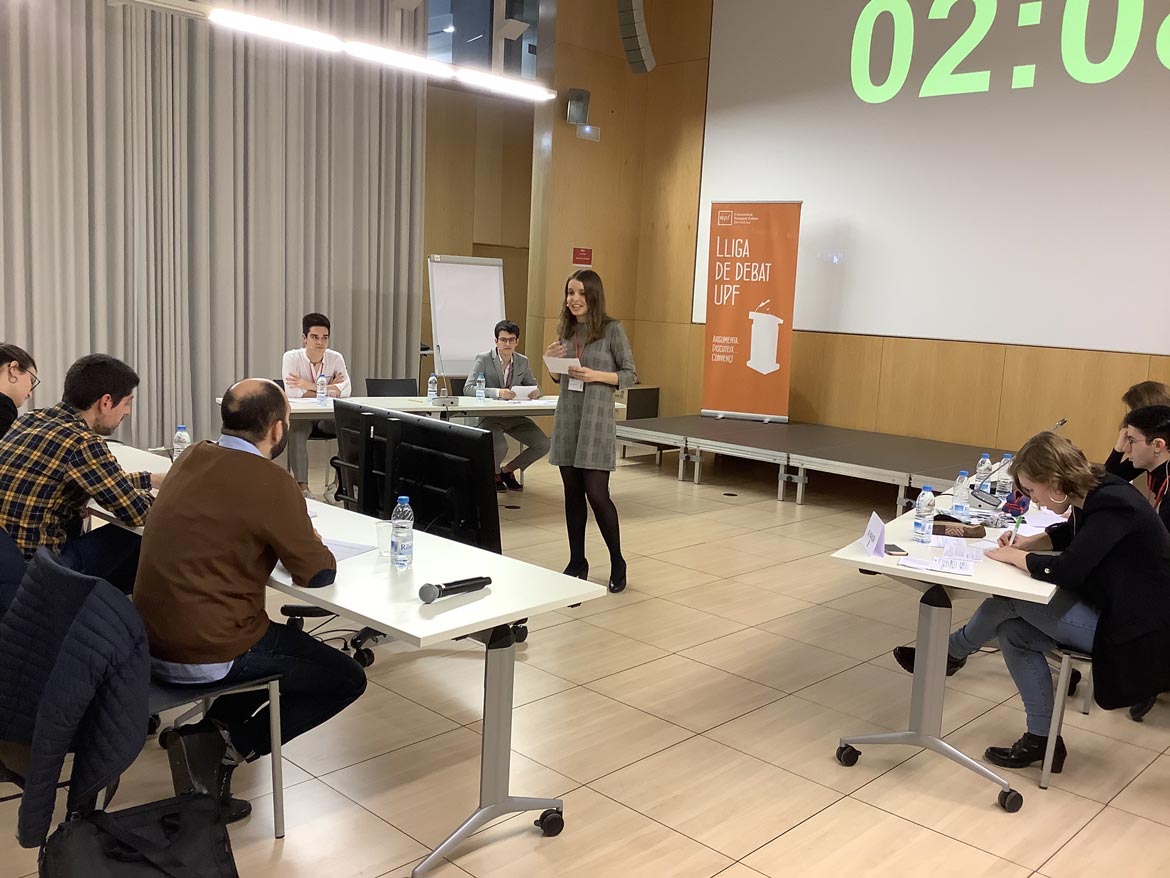
Alba Vilanova focuses on the benefits rather on the social level and for human and personal development: “Communication determines and differentiates who we are as human beings and words are powerful, we must learn how to use them and improve the society in which we live. Knowing how to speak and listen is part of personal development. If you know yourself as a speaker, you also know yourself as a person, your strengths and your weaknesses”.
In secondary and high school settings and in prisons, the benefits are also evident. Enric Matamala comments that the work to prepare for participating in the LDSB is already an excellent activity for students in itself: “They work with very useful cross-cutting tools, such as teamwork, rigour in the search for information, argumentation, speaking techniques and communication skills, as well as values such as respect, tolerance and fair play. Then, the actual competing in the league, “brings the advantage of being able to put into practice everything that has been worked on intensively, as well as students’ huge personal growth, as they see their communicative skills and control of stage fright improve as the competition progresses”. Sergi Lostao adds that secondary schools are increasingly incorporating oratory and debating activities and that there has been an increase in the level in recent years.
They work with very useful cross-cutting tools, such as teamwork, rigour in the search for information, argumentation, speaking techniques and communication skills, as well as values such as respect, tolerance and fair play
If we focus on the penitentiary field, Núria emphasizes that the participating inmates are not initially aware of all the tools they will acquire along the process. But once the league is over, the benefits are fantastic: “They talk of greater self-assurance, belonging to the team, the experience of speaking in public, of feeling heard and in the spotlight; of improvement, acquiring tools to for conversation and interviews, etc. She believes that it does help them with their rehabilitation: “Throughout the league process, a small space of freedom is created, and they have the feeling of making the most of the opportunity. The activity provides them with tools for their life once they are free, to gain security and to feel that they can achieve what they set out to do”.
The Participation Workshop and the minor in Public Speaking, a step beyond training
The UPF Participation Workshop, active since the 2018-2019 academic year, is a training space for acquiring skills, competences and values in the field of student participation and representation, but also communication skills, targeting students who wish to engage in active, effective and efficient student participation. It offers activities and training modules with the aim of expanding knowledge of public speaking and complementing the training provided in the LDUPF.
In addition, the Communication UCA offers the minor in Public Speaking, a project coordinated by the professor Emma Rodero, addressing students from UPF centres and graduates enrolled in the UPF Alumni programme, which allows them to obtain a UPF-endorsed qualification. This minor aims to provide specialized training in oral communication skills so that students are able to give presentations and verbally express themselves properly and efficiency in academic and professional spheres. It offers subjects from different studies related to public speaking and various university activities around the learning of communicative skills, including debate leagues.
Shelia Canudas is one of the students who took this minor last year, and is very satisfied with it: “Both the debate league and the minor were clear opportunities to train in rhetoric and put it into practice, so I took them. In addition, as I study Law, the teachers tell us that in the legal field it is not only important what you say, but also how you say it”. Alba Vilanova also studied it parallel to her Humanities studies: “The minor is an opportunity to demonstrate academically the knowledge of speaking skills acquired, both theoretically and practically. I had fun in subjects such as sports or radio commentating, where I learned new things that I would never have done!”
The minor is an opportunity to demonstrate academically the knowledge of speaking skills acquired, both theoretically and practically.
Taking this minor can be considered as one more station on this “journey” around public speaking, which a student can start at high school, with the LDSB; then, once at UPF, by taking part in the LDUPF, in the Participation Workshop, studying the minor, joining an oratory club, the debate leagues at penitentiary and school centres, or other debate leagues that are being considered (leagues in other languages, etc.). There is also the possibility of being a judge and a trainer/mentor.
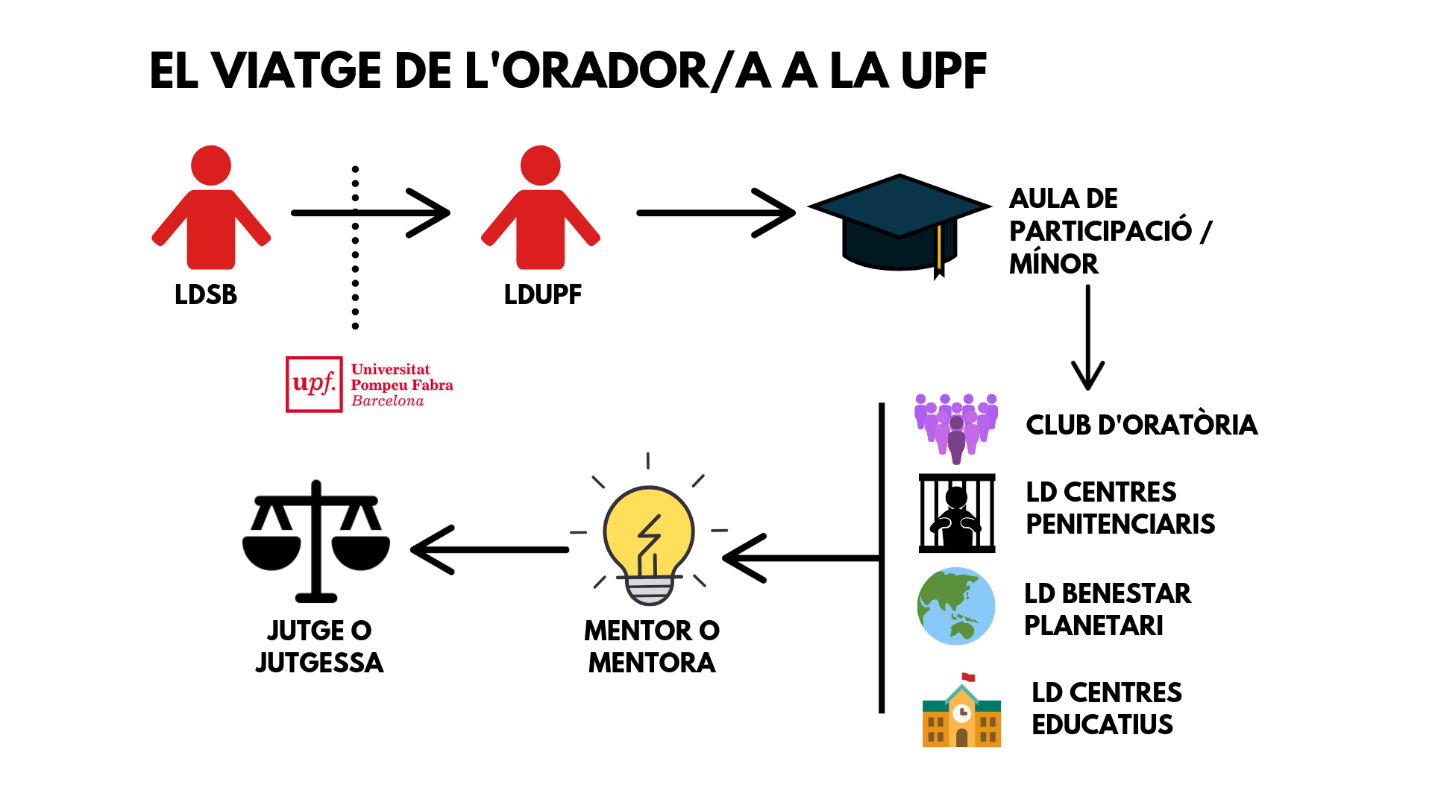
Very high motivation, which gives a message of optimism for the future
All the people who play different roles in the debate leagues agree on one thing and that’s the motivation of their participants and in their good appraisals of the activity. Gemma Garcia, as head of the SACU, receives a great deal of input in this regard: “Most participants highlight the great usefulness of debate leagues for developing their communication skills in an easy and fun way. Through a competition, a kind of ‘game’, they put into practice the resources they have learned in training and are very pleasantly surprised when they see their improvements when speaking in public”, she assures.
These girls and boys end up devoting many hours to working and preparing to face the challenge of the competition. And they do so with enormous joy and great disposition
Enric Matamala, whose view is influenced by his being in contact with teenagers, says that “the degree of involvement and commitment that the members of the debate teams achieve is extraordinary. These girls and boys end up devoting many hours to working and preparing to face the challenge of the competition. And they do so with enormous joy and great disposition”. The teacher at the Ginebró School concludes with a message of optimism: “In an increasingly polarized and Manichaean world, the fact that they are so willing to enter the world of debate, improving their mental dexterity and the critical spirit that this entails, ends up, in short, offering a breath of fresh air and the hope that their generation might improve many things”.






